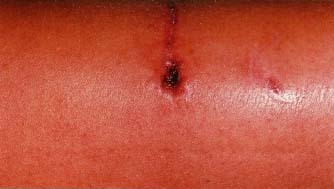Animal Bites
Animal bites are wounds caused by the teeth of a wild or domestic animal or human.
KEYWORDS
for searching the Internet and other reference sources
Infection
Injury
Trauma
Wounds
Are Animal Bites Dangerous?
Animal bites can range from mild to serious. When the skin is not broken, bites usually are not dangerous. When skin, muscles, or tendons are torn, bones are crushed, a deep hole is made (a puncture), or the wound becomes infected by germs in the saliva, then animal bites can be very serious. In these cases, a doctor should examine the wound.
* mammals are warm-blooded animals with backbones, who usually have fur or hair. Female mammals secrete milk from mammary glands to feed their young. Humans are mammals.
Rabies
Rabies is a viral disease that affects the nervous system. A rabid animal, whose saliva contains the rabies virus, can infect another animal or a person by biting them. Any mammal * can get rabies, but it is extremely rare among pets or domestic animals in the United States because they are vaccinated against it. Nine out often cases of rabies occur

Who Bites and Why?
Household pets, such as dogs and cats, cause the majority of animal bites in the United States, and most bites are from animals known to the person bitten.
Dogs
Dog bites usually occur on the hands, face, or legs. About a million people a year seek medical care for dog bites in the United States, and millions more bites are unreported. Sixty percent of those bitten are children, so dog bites are a major health problem of children. Dog bites rarely become infected, and rabies in dogs is rare. On average, 12 people, mostly young children, die each year from dog bites.
Most dogs do not bite unless provoked or teased, so most dog bites can be prevented by following simple guidelines that include:
- Asking permission from a dog's owner before petting the dog
- Not petting unknown dogs
- Not teasing dogs or pulling their ears or tails
- Not bothering dogs when they are eating or sleeping
- Not bothering a dog who is protecting puppies
- Not running away from a growling dog, but instead backing away very slowly or waiting calmly for the dog to leave.
Cats
Cat bites and scratches also are very common, and they are more likely than dog bites to become infected. Cat bites most often involve the hands, followed by the legs, face, and torso. Rabies is rare in cats, but it is more common in cats than in dogs. One infection caused by cat bites or cat scratches is called Cat Scratch Disease. It causes enlargement of the lymph nodes * but usually goes away by itself after about three weeks.
Humans
Human bites are dangerous because the human mouth contains bacteria that can cause serious infection. The most common human bite wound is a "fight bite," one that occurs when one person punches another person and cuts his knuckles on his opponent's teeth. Children sometimes bite other children or adults, and these wounds result from skin being caught between the teeth. The situation can be made worse when people are embarrassed about the bite and do not see a doctor right away, because delay in treatment can allow an infection to develop.
* lymph node is a round mass of tissue that contains immune cells that fight harmful microorganisms. Lymph nodes may become enlarged during infections.
Other Animals
Mice, rats, guinea pigs, and hamsters sometimes bite, as do exotic pets such as ferrets, snakes, and birds. Horses, mules, sheep, pigs, and goats also can bite. Wild animals like skunks, raccoons, and bats bite thousands of people each year, and these bites can be very dangerous because the animals might have rabies.
Wild or wounded animals should never be approached. If a wild animal that usually avoids people instead starts to approach or to seem friendly, it may be sick. An adult should be notified about a sick animal right away. They should call police or park rangers or animal control officers who have been trained to handle sick and injured animals.
How Are Animal Bites Treated?
All bites should be cleaned as soon as possible. If the skin is broken but not torn or bleeding, the wound should be washed with soap and water and treated with antibiotic cream to prevent infection. If the bite is a puncture wound or is bleeding, pressure should be applied to stop the bleeding. In all cases, the wound should be examined by a doctor, who may recommend antibiotics, as well as a tetanus shot if the person has not had one in the last 10 years.
A person with a bite wound should watch for signs of infection, such as redness, swelling, and tenderness around the wound site. If any of these symptoms appear, they should see a doctor immediately.
Resources
American College of Emergency Physicians (ACEP), 111 19th Street NW,
Suite 650, Washington, DC 20036.
Telephone 800-320-0610
http://www.acep.org
American Veterinary Medical Association (AVMA), 1931 North Meacham Road,
Suite 100, Schaumburg, IL 60173.
Telephone 847-925-8070
http://www.avma.org
Comment about this article, ask questions, or add new information about this topic: